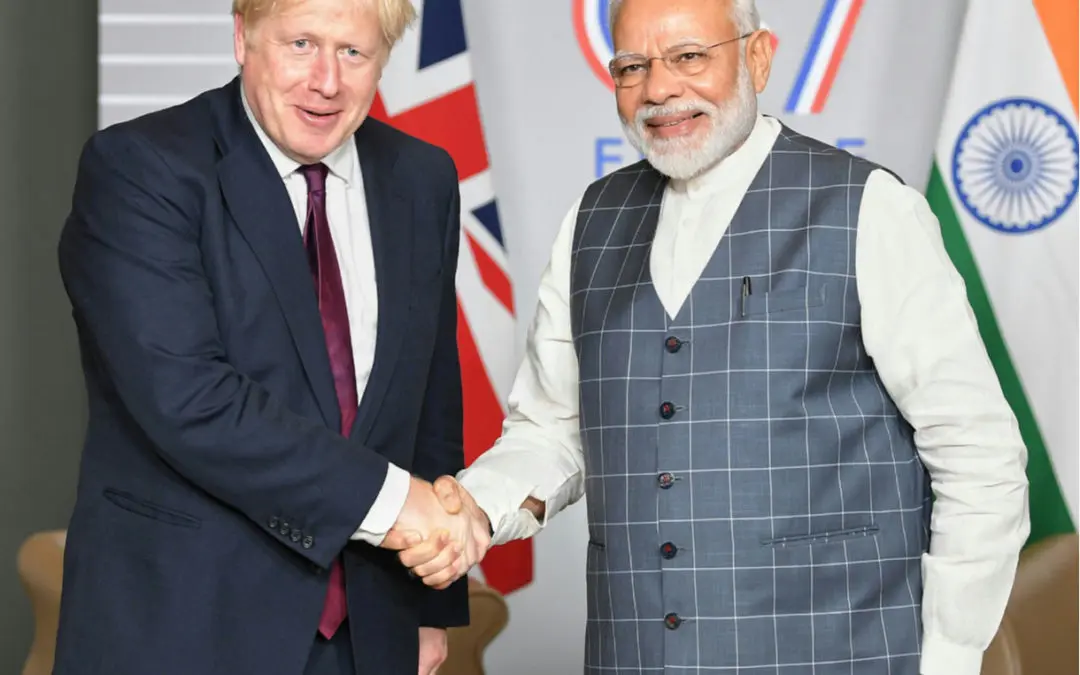The relationship between the world’s oldest democracy and world’s largest democracy has always been special, and since the Conservative Party took office in 2010, the relationship has only gone from strength to strength.
Firstly, the Conservatives were quick to recognise the political and economic importance of the 1.5 million strong British Indian community and, second Brexit meant the need to think outside the box and enhance trade relationships beyond the European Union.
But both countries want to go beyond special and into the strategic, and a new partnership represents a win-win for both London and New Delhi. For the UK, it means greater access to a more lucrative Indian market, the world’s most populous single market and more British-Indian votes at home. For India, it means greater access to the fifth biggest economy in the world, and a strengthened geopolitical position within Asia.
2030 Roadmap
Last month, Prime Ministers Johnson and Modi agreed an Enhanced Trade Partnership (ETP), and launched a 2030 Roadmap, a vision for a revitalised and dynamic UK-India connection, with the goal of elevating the relationship to a Comprehensive Strategic Partnership (CSP), which could then pave the way for a UK-India Free Trade Agreement,
Trade between the UK and India is currently worth around £23 billion per year but could be doubled by 2030 if the roadmap leads to a CSP, and what has already been agreed will see 6,500 new jobs created across the UK, along with over £533m of new Indian investment in growing sectors, such as health and technology.
Making progress with India will not be easy.
Whilst the UK is the second largest investor in India, the Indian establishment is far too often sceptical of foreign investment and the free market. Back in 2007, the EU undertook trade talks with India, but suspended them in 2013, accusing India of a lack of ambition and following disagreements over tariff rules for car parts and free-movement rights for professionals.
India will almost certainly want easier visa access, and in particular for skilled professionals. The recently agreed migration and mobility partnership, creating a new scheme for the exchange of up to 3,000 young professionals each year is welcome news, but falls short and India is likely to demand more. Whilst most of my own family have no interest in leaving in India, those who wish to show little interest in moving to the UK, citing stringent visa requirements. Instead, they point to opportunities in Canada, where they say it is far easier to secure permanent residency.
Despite a growing interest from India from UK food and drink companies, including a rising market share, high tariffs and other restrictions remain, so reduced tariffs will be a key British demand. India is the third largest market for Scotch Whisky, for example but Indian tariffs are a whopping 150%!
This isn’t attributed to protectionism alone, and domestic factors come into play here. The Confederation of Indian Alcoholic Beverage Companies has strongly objected to any plans to slash to the Basic Customs Duty arguing that imports are already dominating the Indian market, and any reduction will squeeze Indian products out because they are subject to multiple regulatory agencies and increased compliance costs. The politics of prohibition remains an issue at state level and are popular, particularly amongst women voters – alcohol bans are currently in force in four Indian states and one union territory.
But a deal boosts India’s standing
Ultimately a deal with the UK is in India’s interests, primarily because it reduces its reliance on trade with China, with whom it has a frosty relationship with, as well as boost India’s post-pandemic economy. It also reaffirms India’s commitment to free trade, amid amplified concerns following India’s decision to opt out of the Regional Comprehensive Economic Partnership, which includes 15 Asia-Pacific nations, including Australia, New Zealand, China, Japan and South Korea.
As a proud British citizen and overseas citizen of India, as well as a frequent visitor to Delhi, I am excited about the future strategic partnership between both countries. But at the same time, I know securing further deals with them will be challenging. Negotiations with India will be different to those of Australia, New Zealand and the United States, and the road from special to strategic will be a far bumpier and bureaucratic ride.
Webinar: Roadmap 2030: Shaping UK-India trade & defining our strategic partnership
To find out more about UK/India trade, Cavendish Advocacy are delving into this further and will be hosting a webinar with Lord Syed Kamall, Pernod Ricard’s Head of International Trade Darya Galperina, and trade experts David Henig and Pallavi Bajaj on Tuesday 6 July, 11:00-12:00.



